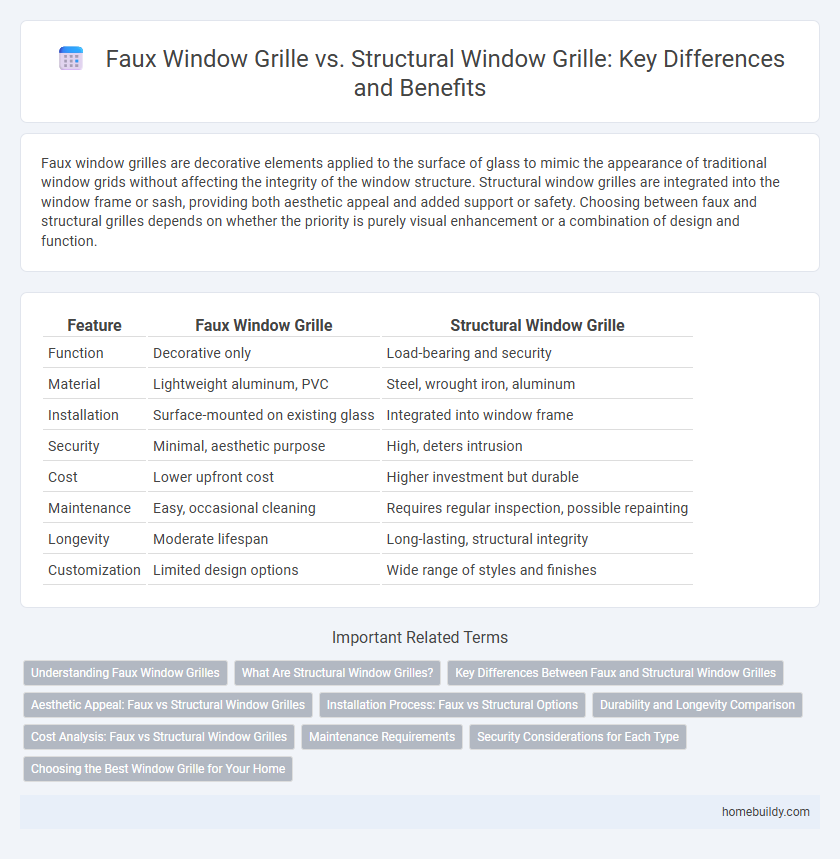Faux window grilles are decorative elements applied to the surface of glass to mimic the appearance of traditional window grids without affecting the integrity of the window structure. Structural window grilles are integrated into the window frame or sash, providing both aesthetic appeal and added support or safety. Choosing between faux and structural grilles depends on whether the priority is purely visual enhancement or a combination of design and function.
Table of Comparison
| Feature | Faux Window Grille | Structural Window Grille |
|---|---|---|
| Function | Decorative only | Load-bearing and security |
| Material | Lightweight aluminum, PVC | Steel, wrought iron, aluminum |
| Installation | Surface-mounted on existing glass | Integrated into window frame |
| Security | Minimal, aesthetic purpose | High, deters intrusion |
| Cost | Lower upfront cost | Higher investment but durable |
| Maintenance | Easy, occasional cleaning | Requires regular inspection, possible repainting |
| Longevity | Moderate lifespan | Long-lasting, structural integrity |
| Customization | Limited design options | Wide range of styles and finishes |
Understanding Faux Window Grilles
Faux window grilles replicate the appearance of traditional structural window grilles without dividing the glass into separate panes, offering a cost-effective and easier-to-clean alternative. These decorative grids attach to the interior or exterior surface of the glass, enhancing aesthetic appeal without compromising the window's insulation or structural integrity. Unlike structural window grilles, faux grilles do not provide additional support but are ideal for homeowners seeking classic design with minimal maintenance.
What Are Structural Window Grilles?
Structural window grilles are integrated into the window's frame or glass, providing both security and architectural support without compromising visibility or natural light. Unlike faux window grilles, which are purely decorative and attached to the window surface, structural grilles reinforce the window's integrity and increase resistance to break-ins and environmental stress. These grilles are often made from durable materials like steel or aluminum, ensuring long-lasting protection and enhanced energy efficiency.
Key Differences Between Faux and Structural Window Grilles
Faux window grilles are decorative overlays attached to the exterior or interior of glass panes, offering aesthetic appeal without providing structural support or added security. Structural window grilles are integrated within the window frame or glass unit, enhancing durability, security, and energy efficiency by reinforcing the window's strength. The primary differences lie in functionality--faux grilles prioritize design, while structural grilles combine style with practical benefits such as improved insulation and protection.
Aesthetic Appeal: Faux vs Structural Window Grilles
Faux window grilles offer aesthetic appeal by mimicking the look of divided panes without compromising window performance, ideal for enhancing design without structural alterations. Structural window grilles provide authentic architectural detail, integrating firmly with window construction to deliver both decorative and functional benefits. Choosing between faux and structural grilles depends on balancing visual style preferences with durability and maintenance considerations.
Installation Process: Faux vs Structural Options
Faux window grilles are installed by attaching lightweight frames directly onto the window glass or surface, requiring minimal tools and no structural alterations, making the process faster and less invasive. Structural window grilles involve integrating metal or wood bars into the window frame or wall during construction or retrofitting, demanding professional installation due to the need for precise measurements, drilling, and secure anchoring. The choice between faux and structural options significantly impacts installation time, complexity, and potential remodeling costs.
Durability and Longevity Comparison
Faux window grilles, made from lightweight materials like aluminum or PVC, offer aesthetic appeal but generally have lower durability and shorter lifespan due to vulnerability to weathering and physical damage. Structural window grilles, crafted from robust metals such as steel or wrought iron, provide superior strength and resistance, ensuring enhanced durability and longevity for security and support. Choosing structural grilles results in long-term investment with minimal maintenance, while faux grilles may require periodic replacement or repairs to maintain appearance and function.
Cost Analysis: Faux vs Structural Window Grilles
Faux window grilles offer a cost-effective alternative to structural window grilles, typically costing 30-50% less in both materials and installation due to their lightweight design and simpler mounting methods. Structural window grilles require heavy-duty materials such as wrought iron or steel, increasing initial investment and maintenance expenses but provide enhanced security and architectural integrity. Choosing between faux and structural options hinges on budget constraints, desired durability, and the importance of authentic structural support.
Maintenance Requirements
Faux window grilles require minimal maintenance since they are primarily decorative and do not bear structural loads, often made from durable, low-maintenance materials like vinyl or aluminum. Structural window grilles, constructed from steel or wrought iron, demand regular inspection for rust, repainting, and occasional repairs to ensure long-term integrity and safety. Choosing between faux and structural grilles largely depends on balancing aesthetic preferences with the desired level of upkeep and durability.
Security Considerations for Each Type
Faux window grilles offer aesthetic appeal without compromising the integrity of the window but provide minimal security against forced entry due to their non-structural nature. Structural window grilles are constructed from robust materials like wrought iron or steel and are securely anchored, delivering significant protection by acting as a physical barrier against intruders. When prioritizing security, structural grilles are the preferred choice because their design and installation enhance window resistance to break-ins, unlike decorative faux options.
Choosing the Best Window Grille for Your Home
Faux window grilles offer aesthetic appeal with easy installation and minimal maintenance, making them ideal for homeowners seeking decorative enhancements without structural alteration. Structural window grilles provide increased security and durability, as they are integrated into the window frame and constructed from strong materials like steel or wrought iron. Selecting the best window grille depends on balancing design preferences, security needs, and budget considerations to ensure optimal functionality and curb appeal for your home.
Faux window grille vs Structural window grille Infographic

 homebuildy.com
homebuildy.com